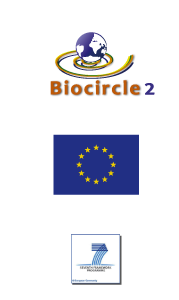Biocircle 2
REINFORCING THE INTERNATIONAL COOPERATION IN FP7 FAFB STRENGTHENING THE CIRCLE OF THIRD COUNTRIES BIO NCPs
CONTACT
Christophe Cotillon (Actia)
Tel.: 33 (0)1 44 08 86 15
COORDINATION
Apre (Italy)
Partners
Twenty-one partners.
Five European countries: Germany (Research Centre Jülich), France (Actia), Greece (Hellenic Food Authority-Efet), Hungary (Science and Technology Foundation-Tetalap), Italy (Agency for the Promotion of the European Research-Apre).
Sixteen countries from outside the European Union: South Africa (South African Department of Science and Technology), Argentina (Ministry of Science, Technology and Productive Innovation), Brazil (Brazilian Agricultural Research Corporation-Embrapa), Canada (Agriculture and Agri-food Canada), Chile (Conicyt), China (Chinese Academy of Agricultural Sciences), Egypt (National Research Centre), Ghana (Forum for Agricultural Research in Africa), India (Jawaharlal Nehru University), Kazakhstan (InExCB-Kz), Morocco (Hassan II Institute of Agronomy and Veterinary Medicine), Mexico (University of Mexico), New Zealand (Euro Research Support Limited), Russia (Russian Academy of Sciences-INBI), Tunisia (Centre of Biotechnology of Borj-Cedria), Ukraine (National University of Life and Environmental Sciences).
BEGINNING OF PROJECT
February 2011
DURATION
24 months
Reference
Objectives
In the 7th FP, the need for a close partnership between the European national contact points (NCPs) and those of countries outside of Europe is clearly established.
In two years, BioCircle has extended the network of national contact points, participating in theme 2 "Food, agriculture, fisheries and biotechnologies", to the National Information Points for countries outside of Europe considered as major partners (Bio NCP non-European countries).
Currently, this consists in strengthening this partnership and intensifying the participation of researchers from non-European countries in European research projects.
Three major roles for this worldwide network:
Become a determining factor in the framework of strategic partnerships involving the best scientists in countries outside of Europe and in Europe.
Facilitate access to different research environments for European researchers.
Assist in pin-pointing the problems that the countries outside of Europe are up against, and which are of a multilateral interest, and as such make research interesting and beneficial for a greater number
Actions
Setting up of regional coordinators, with the role of leading actions between countries in the same region and with Europe, as well as promoting potential research in non-European countries. Four regions have thus been defined: Africa & Mediterraean countries, Asia & Oceania, Eastern Europe & Central Asia, and America.
Training of researchers at national and regional levels, as well as training of Bio NCPs.
Organisation of exchanges and visits by researchers between non-European and European countries and business agreements, in order to facilitate integration of researchers and companies from non-European countries in European projects.




